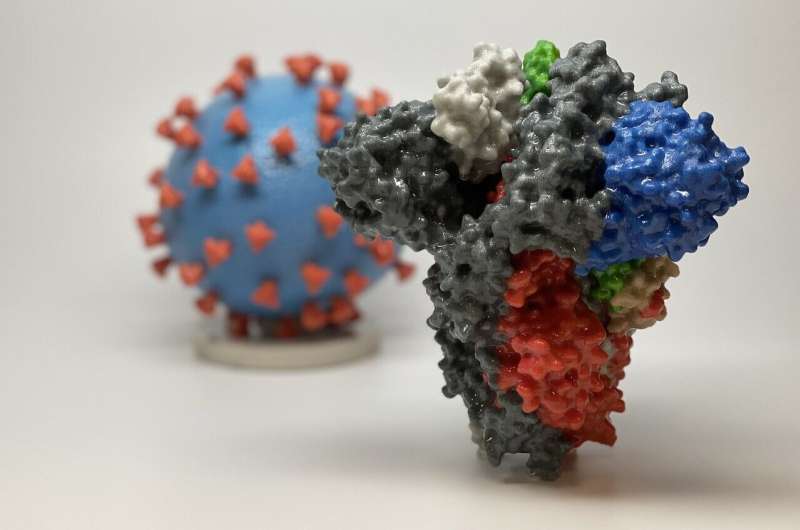3D print of a spike protein of SARS-CoV-2, the virus that causes COVID-19—in front of a 3D print of a SARS-CoV-2 virus particle. The spike protein (foreground) enables the virus to enter and infect human cells. On the virus model, the virus surface (blue) is covered with spike proteins (red) that enable the virus to enter and infect human cells. Credit: NIH
Spain reported a new daily record of 849 coronavirus deaths on Tuesday, but health officials said the trend in new infections continues to decline.
After Italy, Spain has suffered the world's second most deadly outbreak with the loss of 8,189 lives. The latest figures came a day after the death toll had dipped slightly, raising hopes the epidemic could be peaking.
Meanwhile, the number of confirmed cases rose to 94,417 after 9,222 more people tested positive, an increase of almost 11 percent.
That figure was another setback after a week of steady declines, with the number on Monday representing a rise of just over 8.0 percent.
"It's true that today we have a slight increase in the number of cases," said Maria Jose Sierra, from the health ministry's emergencies coordination unit.
But the downward trend "is continuing", she insisted, given that a week ago, the rate of new infections was around 20 percent.
One reason for the uptick in new cases was that many of those detected over the weekend were only now included in the tally, she explained.
A clearly positive development was that more than 2,000 patients were declared cured in the latest 24-hour period, bringing to 19,259 the total since the outbreak began.
On day 18 of a four-week national lockdown to slow the spread of COVID-19, Spain also sought to dramatically ramp up testing.
It is sourcing kits from around the world to test 50,000 people per day, up from around 20,000 at present.
Like many countries, the Spanish health care system is stretched to its limit by a massive influx of seriously ill patients and a growing number of medical staff falling sick themselves.
There are now more than 5,500 people in intensive care units across the country, which had just over 4,000 ICU beds before the COVID-19 outbreak hit.
Intensive care restricted
At Madrid's Puerta de Hierro hospital, staff moved 90 beds into archive rooms and other spaces, including 10 to 20 extra ICU beds, Nuria Martinez, a doctor at the hospital, told AFP by telephone.
But they must still restrict access to those extra beds, she noted.
"A patient over the age of 65 with many chronic conditions is not admitted," Martinez said, before adding: "We are starting to run out of medicine.
"I think we will not see a decrease in pressure on intensive care units, at least not this week."
Authorities in Madrid, the worst-hit region, are using a big exhibition centre and a string of hotels to house the sick, and are setting up two temporary morgues, one inside an Olympic-sized ice skating rink.
© 2020 AFP






















